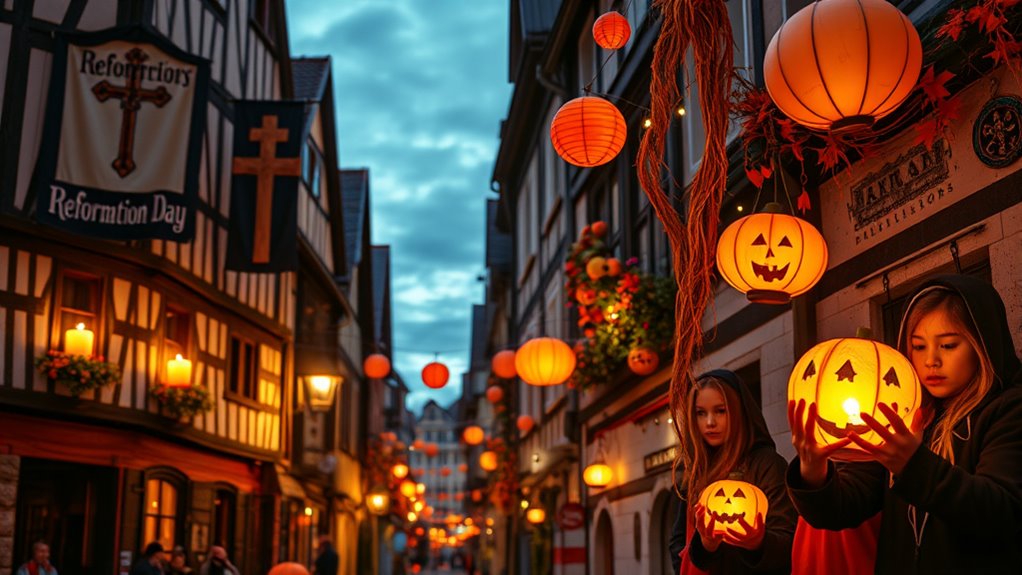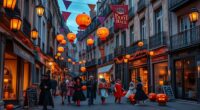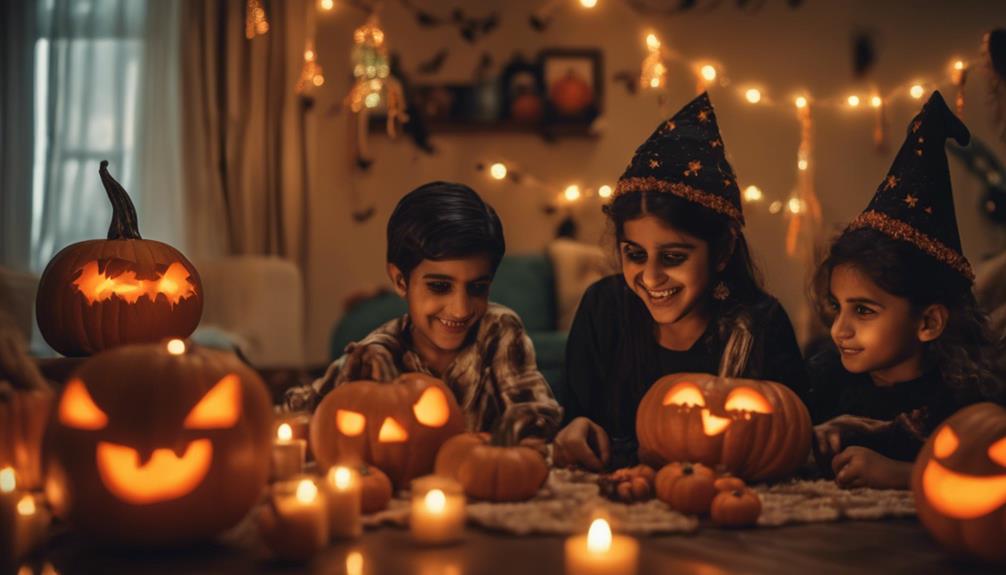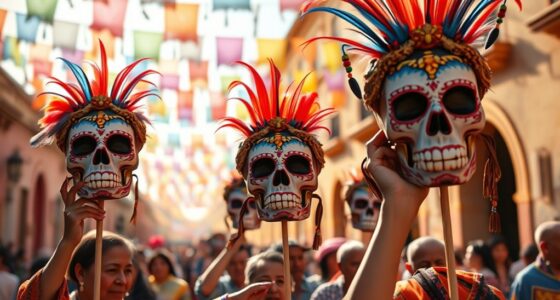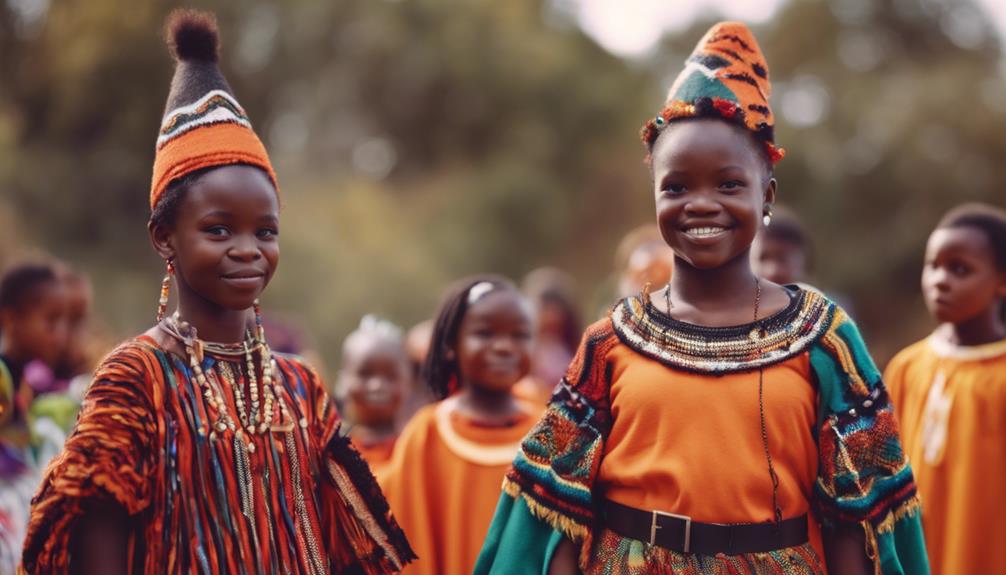In Germany, Reformation Day is a solemn celebration honoring Martin Luther’s 95 Theses, focused on faith and religious history, often marked by church services. Meanwhile, Halloween is a lively, modern event where children dress in costumes and enjoy parties and spooky activities. The two coexist harmoniously, with communities balancing reverence and entertainment. Exploring further reveals how Germany beautifully blends its rich traditions with contemporary festivities.
Key Takeaways
- Reformation Day is a solemn religious observance commemorating Martin Luther’s 95 Theses, while Halloween is a festive, entertainment-focused celebration.
- Reformation Day emphasizes faith, reflection, and church services, whereas Halloween features costumes, parties, and themed entertainment.
- In Germany, Reformation Day is rooted in historical and religious traditions, often observed with reverence; Halloween has become a popular modern cultural event.
- Both celebrations coexist in Germany, with communities balancing solemn religious observances and lively festive activities.
- Germany’s approach blends respect for its religious heritage with embracing contemporary Halloween festivities, reflecting cultural diversity and adaptation.
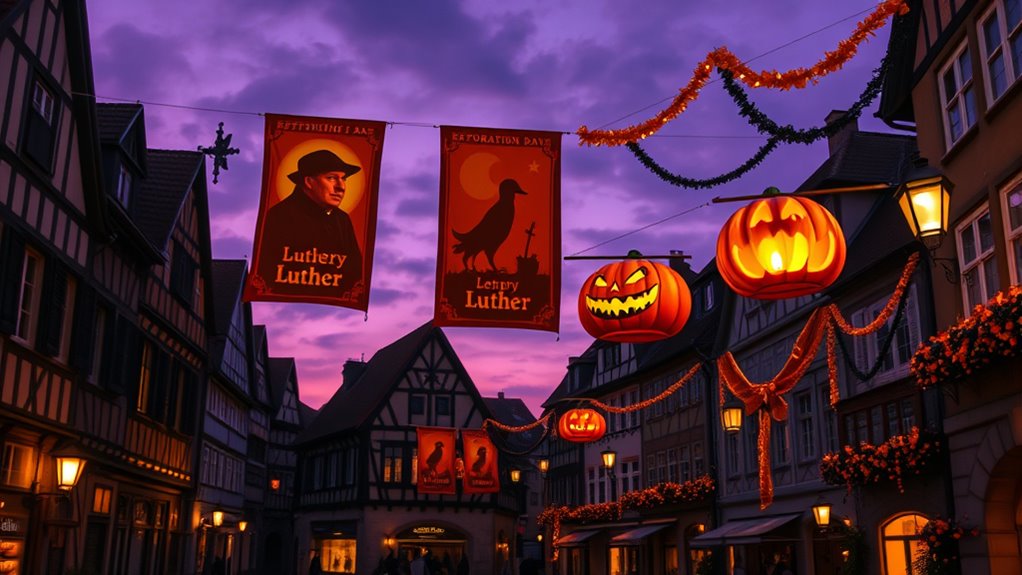
Have you ever wondered how Germany balances its traditional Reformation Day with the modern festivities of Halloween? It’s a fascinating blend of history, religion, and cultural celebrations that come together to shape the country’s unique approach to these two observances. Reformation Day, rooted in religious traditions, marks the anniversary of Martin Luther’s 95 Theses and the start of the Protestant Reformation. It’s a solemn day for many Germans, especially in regions with strong Lutheran roots. You’ll notice that on this day, churches hold special services, and communities often gather to reflect on faith and history. It’s about honoring religious traditions that have been passed down through generations, emphasizing spiritual significance rather than commercial appeal.
Meanwhile, Halloween has gained popularity primarily through cultural celebrations influenced by American traditions. You might see children dressed in costumes, going door-to-door for candy, or parties themed around spooky stories and haunted houses. Though Halloween’s origins aren’t religious, it’s become a lively, fun-filled event that appeals to all ages. Many towns and cities now host Halloween festivals, parades, and themed events, creating a festive atmosphere that contrasts sharply with the more serious tone of Reformation Day. Despite these differences, the two celebrations coexist, often within the same communities, each catering to different interests and cultural sensibilities.
You’ll find that in some areas, Reformation Day is still observed with a certain reverence, especially in churches and schools that focus on its religious significance. On the other hand, Halloween’s popularity has led to more commercialized events, costume contests, and community activities that emphasize entertainment and social gathering. This dynamic reflects how Germans have embraced modern cultural celebrations while still respecting their religious traditions. It’s not uncommon now to see both celebrations happening side by side—church services in the morning and costume parties in the evening—highlighting the country’s ability to honor its history while also enjoying contemporary festivities. Additionally, some communities incorporate cultural adaptation to blend these observances harmoniously.
For you, experiencing this balance means witnessing a country that values its religious roots without ignoring the appeal of modern cultural celebrations. It’s about understanding how tradition and innovation can coexist, creating a rich tapestry of observances that resonate with diverse interests. Whether you’re participating in a church service, attending a Halloween party, or simply observing the local customs, you’ll notice how Germany manages to keep its history alive while embracing new ways to celebrate. It’s a beautiful example of cultural harmony, where past and present come together to shape the way a nation observes its significant days.
Frequently Asked Questions
How Do Germans Traditionally Celebrate Reformation Day?
On Reformation Day, you typically observe religious traditions that commemorate Martin Luther’s pivotal role in history. You might attend church services, reflecting on his efforts to reform Christianity. Some communities organize special events, like lectures or historical reenactments, highlighting his influence. It’s a day to celebrate faith and history, with many Germans recognizing it as a time to honor the cultural and religious significance of the Reformation, rather than just a holiday.
Are Halloween Costumes Common in Germany?
Imagine stepping into a world where costumes tell stories and spark imagination. In Germany, Halloween costumes have become increasingly popular, evolving with the latest costume trends. While the holiday’s significance is rooted in spooky fun, many embrace it as a chance to showcase creativity and join in festive celebrations. So, yes, Halloween costumes are common, turning ordinary streets into a patchwork of imagination and spooky delight.
Do Schools in Germany Observe Reformation Day?
In Germany, schools typically do not observe Reformation Day as a secular celebration or religious observance, especially in regions where it isn’t an official public holiday. You might notice some religious schools or communities acknowledging it, but most public schools focus on secular activities. Reformation Day remains more of a cultural and religious observance rather than a widespread school event, highlighting Germany’s balance between tradition and secular education.
What Are the Origins of Halloween’s Popularity in Germany?
You might find that Halloween’s popularity in Germany stems from historical influences and cultural integration. Over time, American movies, TV shows, and global celebrations have introduced Halloween, blending it with local customs. As a result, Germans embrace Halloween for fun, dressing up and trick-or-treating, even though it isn’t a traditional holiday. This cultural exchange has made Halloween a widely enjoyed event, reflecting how global influences shape local traditions.
How Do Germans View Halloween Compared to Reformation Day?
You’ll notice that Germans see Halloween mainly as a fun, secular celebration emphasizing costumes and candy, reflecting cultural differences from traditional observances. Reformation Day, on the other hand, holds significant religious importance, commemorating Martin Luther’s impact on Christianity. While Halloween’s popularity grows, many still prioritize Reformation Day’s religious significance, highlighting Germany’s respect for its historical and spiritual roots. This contrast underscores the balance between modern festivities and cultural traditions in Germany.
Conclusion
So, whether you celebrate Reformation Day or Halloween, think of it like choosing between a historic tree with deep roots and a colorful, spooky festival. Both offer unique ways to connect with traditions—one rooted in faith and history, the other in fun and fright. Whichever you prefer, embrace it fully. After all, celebrating your way is like enjoying a piece of autumn’s crisp air—refreshing and memorable.
